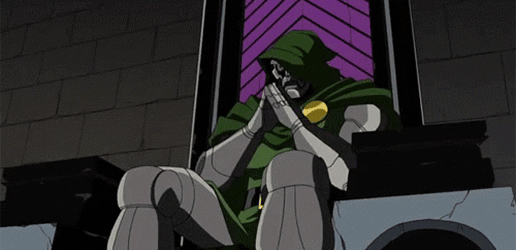Do we have the will to fix our health-care system?
(Originally posted with gratitude at HealthyDebate.ca)
While Kevin Feige needs to take advice from no one, including me, I am hopeful that Victor von Doom is the next big threat in the Marvel Cinematic Universe (MCU) now that Thanos the Mad Titan has been dispatched in the Infinity Saga and Kang the Conqueror has been sidelined by legal trouble on Earth-616.
According to Wikipedia: Doctor Victor von Doom made his debut in The Fantastic Four #5 back in 1962. The monarch of the fictional nation of Latveria, Doctor Doom has been portrayed as both a supervillain and antihero, and is most frequently depicted as the archenemy of the Fantastic Four.
Doctor Doom was ranked #4 by Wizard on its list of the 101 Greatest Villains of All Time and #3 on IGN's list of the Top 100 Comic Book Villains of All Time.
If I was on that list ahead of Doom, I would be very nervous right about now.
OK, so I know what you’re going to say. Why is a palliative care physician writing about Doctor Doom? Isn’t that a bit on the nose? And perhaps a tad morbid?
Maybe. But if you will humour me, hopefully the point will present itself.
A story I find uniquely fascinating is Doomworld. In a six-part series of comics published in 2010, Doctor Doom enters the kingdom of Wakanda to access its vast supply of Vibranium that he needs for his plans of world domination. Vibranium is a precious metal and source of great national pride for Wakanda, as such protected at all costs (sounds a lot like Canadian health care).
As a final failsafe, it is guarded by the Egyptian god Bast, who demands a “purity test” for all who seek Vibranium. Doom succeeds in acquiring the precious metal because he has “has seen the future as a sorcerer and thus has seen the world led to ruin in countless futures” except in one single glimmering” scenario. The “purity” of his vision that he can save the world convinces Bast, the protector of the metals, to cede him the Vibarnium.
There is one particular exchange between Bast and Doom that resonates with me.
Doom: “My methods are a means to an end. No different than weeds being pruned in order for an orchard to flourish. Those who stand in the way of my vision oppose me because they fear me, but more than that they fear what I represent. Change.”
Sound similar to health care in Canada?
Bob Bell is a former Deputy Health Minister for Ontario and orthopedic surgeon. Along with Anne Golden, Paul Alofs and Lionel Robins, he published “Fixing Health Care” in a Globe and Mail series addressing “10 common problems faced by patients in the public health system across Canada.”
I enjoyed reading and debating the solutions proposed by Bell et al. Their first recommendation about primary care spurred a vigorous debate online. Indeed, it turned out to be an interesting series. Other topics for “healthy debate” include a national pharmacare, standalone surgical centers, eReferral, etc.
This is not the first time or last time the topic of health care will be subject to debate. Panels have been stuck. Articles and reports have been written. I enjoyed Dr. Danielle Martin’s “Better Now: Six Big Ideas,” Jeffrey Simpsons “Chronic Condition” and Andre Picard’s “Matters of Life and Death.” Recently, Dr. Jane Philpott is touring in support of her new book, “Health for All.” My favourite chapters were the ones title “Meaning” and “Purpose.” I have even posted some thoughts of my own.
Some may accuse Bell and his group of “villainy.” His motives are often considered nefarious by some health-care providers. But, like Doom, he is simply seeking a better world, in this case, a better Canadian health-care system. Like Doom, he is often misunderstood and misrepresented. Doom is a fervent protector of his country, Latveria, and Bell is a proud Canadian who has worked in public service for many years.
I had the pleasure of working across the table from Dr. Bell during the 2017 Physician Services Agreement (PSA) negotiations from 2017-2019. As lead for the ministry team, he was a hard negotiator but one I respected. We didn’t always agree then and I am certain we may not see eye-to-eye now (dude is like 6-foot something while I am 5-10 if try real hard). I welcome new ideas and revisiting some old ones too. I enjoyed reading this series and interested to see what new ideas Bell might have in the future.
But even more so, I am interested in knowing if Canadians reading this are truly invested in change.
We collectively suffer from a unique sense of Canadian exceptionalism, that our system is not only the best but the only system that can work, will work. I’ve written previously about the power of ideas. But ideas remain just that if there is not a will to change.
A recent article by Josh Dehass outlines one approach in Norway. Dehaas dares to speak HERESY and discuss private healthcare. In Norway, for example, 10% of the population has private insurance.
Dehass explains: “Before you label me a monster for supporting the dreaded “two-tier American-style health care,” please consider the facts. Canada stands alone among wealthy nations in outlawing privately funded, medically necessary surgical and hospital care, and it also ranks among the worst for outcomes despite spending more than most, 10th out of 11, according to the Commonwealth Fund. As anyone who’s seen the subway ads advertising clinics in Buffalo knows, we already have two tiers: those who can afford to leave the country for prompt care and those who can’t.”
The solution?: There is an obvious way to find the money: it would simply require amending the Canada Health Act to make explicit that provinces would no longer be penalized if they allowed a small number of willing patients to buy quicker care so that provinces can loosen their rules.
This would then free up scarce resources such that provinces could expand public drug coverage beyond their current programs. One might think of it as a policy swap whereby public coverage would be somewhat curtailed for hospital and physician services and somewhat expanded for drugs.
Dehass concludes: “The question we should ask is not whether we can stomach two-tier care but whether most of us would be better off if we allowed a small percentage of people who are unable or unwilling to languish on lengthy waitlists to spend their own money here in Canada to get seen faster.”
The Canadian system is currently set up to get the results it does, and it will continue to do so until we acknowledge and accept the need for change.
Health care in Canada is often referred to as “the third rail.” A political hot potato. Doctor Doom would have the will to grab that rail, hold on and attempt to bend it.
The conclusion to Doomworld is strangely prophetic. Having acquired the Vibranium, Doom crafts an invincible armor and army of indestructible Doombots. In the climactic battle, Doom goes head-to-head with T'Challa, protector of Wakanda. Doom’s hubris proves to be his downfall. T'Challa is able to tap into Doom's armor and sacrifice all Wakandan vibranium, rendering it permanently inert. Though Doom believes that Wakanda can’t survive without the Vibranium, T’Challa believes that he has, in fact, just saved his people and changed their future for the better.
In this case, Vibranium could be seen as an analogy for our health care system. Do we preserve it in its current form at all costs or do we have the courage to make the necessary changes, no matter how painful those changes might be?
Who is right? Do we have the will to do that which must be done? Superheroes won’t provide us the answer. It will be up to Canadians to decide.








Darren, I'm not sure if vibranium is a good analogy for Canada's health care system. Vibranium is invaluable and desperately sought after the world over. That said, much like vibranium, the notion that our single-payer health care system represents a core value of what it means to be Canadian and social collapse would follow its dissolution, is fictional.
As time goes on, and we see more and more news stories about this or that clinic subverting the single-payer model (let's set aside the Shouldice Hospital has been private pay for decades without protest), the only people that seem terribly outraged are the political class (including some pundits) and health care institution leaders. The rest of us "unwashed masses" either don't understand the issue or the fuss, don't care (or don't care all that much), and have more immediate problems to deal with.
As for the uniquely Canadian canard of the "threat of U.S.-style health care", it ignores over so many broken and corrupt aspects of the U.S. system and political bodies that it's of no use whatsoever beyond political fear mongering.
Thanks Frank. A thoughtful and through response as always.